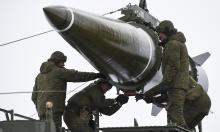Sergei Lavrov responds to rumours about Putin's alleged illness and anger
Russian Foreign Minister Sergei Lavrov, in an interview with French TV channel TF1, responded to rumors about Russian President Vladimir Putin's alleged illness. The journalist told the minister that according to those rumours the Russian president was "sick, that he was angry because his original plan was not carried out".
Lavrov responded that Putin appears in public every day, that one can watch him on TV, read and listen to his speeches. The Russian Foreign Minister refuted the rumours about Putin's deteriorating health.
"I don't think that sane people can see signs of some kind of illness or ailment in this person. I leave it to the conscience of those who spread such rumors even though they can see it with their own eyes to make sure what some people look like," Lavrov said.
In early May, Lavrov advised those in the West who doubt Putin's health should contact the president's foreign guests — world leaders, whom the head of state has recently met, including UN Secretary-General António Guterres.
In March, Belarusian President Alexander Lukashenko said that his Russian counterpart was in his best shape. According to Lukashenko, all reports of Putin's alleged health problems were rumors that Western countries spread to undermine Putin's authority.
Kremlin spokesman Dmitry Peskov said that Putin had never contracted coronavirus during the entire period of the pandemic and was revaccinated in a timely manner.
In the above-mentioned interview, Lavrov also gave his assessment to the course of the special military operation in Ukraine. The journalist asked him whether it could be regarded as Russia's success or failure. Sergei Lavrov stressed that Moscow was not considering its actions in the international arena as Russia's intention to strive for success or approval. Instead, Moscow is doing what it has to do — Russia is protecting its people and language while exterminating Nazism.
The minister recalled that for many years Russia had been urging Western colleagues to force Ukraine to comply with international treaties and conventions to which it had acceded. However, Russia had not received support. Moscow had announced a security threat on its borders long before the operation began, but the West ignored Moscow's calls yet again, Lavrov said.
Lavrov also recalled Moscow's demands during the special military operation in Ukraine. Russia was protecting civilians in the Donbass, while the West was making Ukraine a Russia's enemy. Therefore, Russia decided to protect the Russian language and the Russian people living on the Ukrainian territory.
On February 24, Russian President Vladimir Putin announced the start of a special military operation in the Donbass. The decision followed the recognition of the Donetsk and Luhansk People's Republics.
Subscribe to Pravda.Ru Telegram channel, Facebook, RSS!





